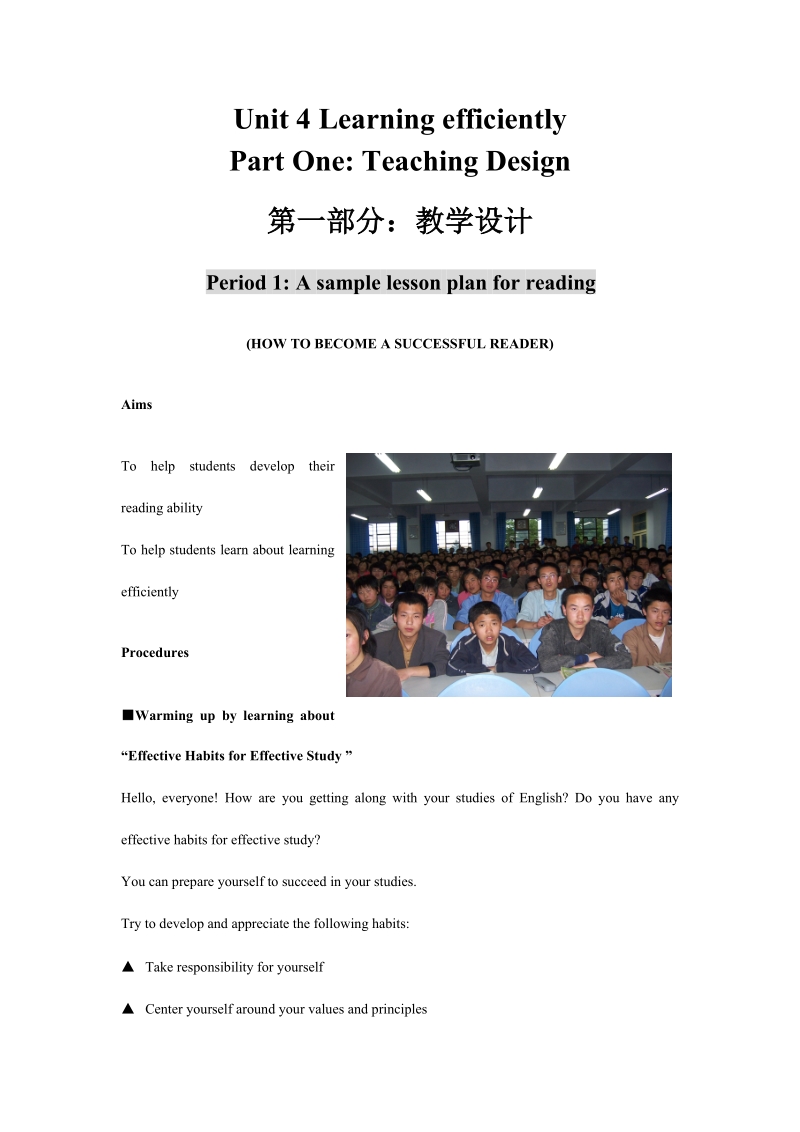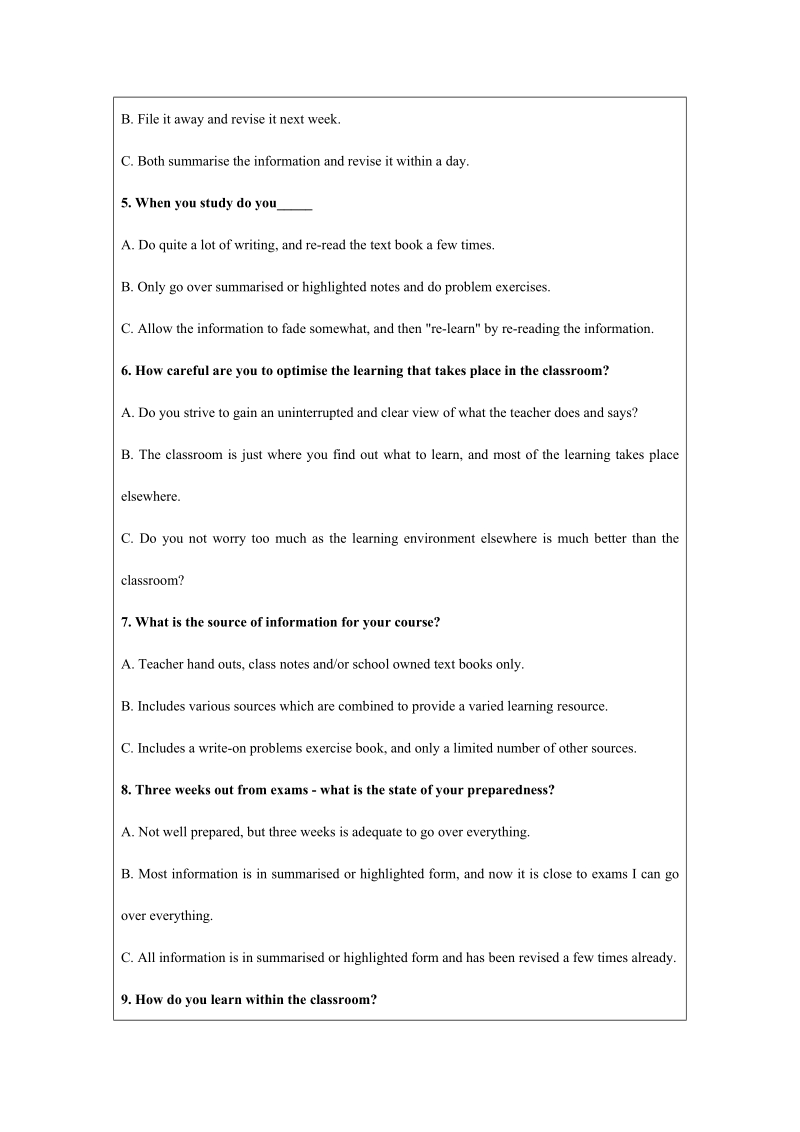 人教新课标高中英语选修十《Unit4 Reading》教学设计
人教新课标高中英语选修十《Unit4 Reading》教学设计
《人教新课标高中英语选修十《Unit4 Reading》教学设计》由会员分享,可在线阅读,更多相关《人教新课标高中英语选修十《Unit4 Reading》教学设计(21页珍藏版)》请在七七文库上搜索。
1、Unit 4 Learning efficiently Part One: Teaching Design第一部分:教学设计Period 1: A sample lesson plan for reading(HOW TO BECOME A SUCCESSFUL READER)AimsTo help students develop their reading ability To help students learn about learning efficientlyProceduresWarming up by learning about “Effective Habits for
2、Effective Study ”Hello, everyone! How are you getting along with your studies of English? Do you have any effective habits for effective study?You can prepare yourself to succeed in your studies.Try to develop and appreciate the following habits: Take responsibility for yourself Center yourself arou
3、nd your values and principles Put first things first Discover your key productivity periods and places Consider yourself in a win-win situation First understand others, then attempt to be understood Look for better solutions to problems Look to continually challenge yourself Warming up by checking y
4、our learning efficiencyMorning, class! How efficient are you art studies? Before we read the text “How to become a successful reader”, lets check our learning efficiency by taking this quiz. 1. Your routine for homework and study can be described as_A. Flexible B. Somewhat pre-planned but no fixed p
5、attern. C. Fairly regular and fixed in structure.2. In what ways do you optimise your study environment, _A. Your study environment varies day by day.B. You know the best study environment for yourself.C. You are careful about your study environment. You have tried things like background music and d
6、ifferent types of lighting.3. When you have not fully understood something in class do you_ A. Make it a priority to gain complete understanding ASAP.B. For reasons of efficiency, let these issues cumulate and deal with them at a later date.C. Catch it up when going over the work prior to exams.4. W
7、hen you have fully understood something do you_ A. Move on to the next challenge and revise it at a later date.B. File it away and revise it next week.C. Both summarise the information and revise it within a day.5. When you study do you_ A. Do quite a lot of writing, and re-read the text book a few
8、times.B. Only go over summarised or highlighted notes and do problem exercises.C. Allow the information to fade somewhat, and then “re-learn“ by re-reading the information.6. How careful are you to optimise the learning that takes place in the classroom? A. Do you strive to gain an uninterrupted and
9、 clear view of what the teacher does and says?B. The classroom is just where you find out what to learn, and most of the learning takes place elsewhere.C. Do you not worry too much as the learning environment elsewhere is much better than the classroom?7. What is the source of information for your c
10、ourse? A. Teacher hand outs, class notes and/or school owned text books only.B. Includes various sources which are combined to provide a varied learning resource.C. Includes a write-on problems exercise book, and only a limited number of other sources.8. Three weeks out from exams - what is the stat
11、e of your preparedness?A. Not well prepared, but three weeks is adequate to go over everything.B. Most information is in summarised or highlighted form, and now it is close to exams I can go over everything.C. All information is in summarised or highlighted form and has been revised a few times alre
12、ady.9. How do you learn within the classroom? A. You concentrate on taking in (and writing down) the notes and exercises.B. You make sure you understand things before you write the information down.C. You strive to understand rather than write anything, and look up the references later.10. How invol
13、ved are your parents or friends in the learning process? A. They are not involved.B. You often discuss school learning with parents or friends.C. Your parents know how much work you are doing, and you often do homework or study with your friends.11. When you get help with your school work, how do yo
14、u interact with the tutor? A. You let them decide and follow their advice on what you should be doing to improve.B. You show them your exam results and the tutor shows you how to do the problems where you lost marks.C. You compile a list of questions and concepts that you are struggling with.12. The
15、 way you use tutors is_ A. As a last resortB. Your first optionC. Relaxed - when they are available, you let them call the shots. Warming up by sharing English learning experiences with othersIn this section, we shall learn about Learning Efficiently. But first you are to have a group meeting to des
16、cribe and share your English learning experiences with your classmates. The information in the box might be helpful to you.Motivation: Become a person who likes to learn English. Dictionary: Get a good English dictionary. No mistakes: Avoid mistakes. Try to use correct English from the beginning. Pr
17、onunciation: Learn to pronounce English sounds. Learn to understand phonetic transcription and the phonetic alphabet. Input: Get English into your head by reading and listening to lots of English sentences. Reading Movies Adventure gamesI. Pre-reading Consider these five types of reading, and write
18、an occasion when you have used them:1. Scanning This is looking over a text quickly to get a specific piece of information. On a piece of paper, complete this “I have used scanning to read.“ 2. Skimming Looking over the text quickly to get a general idea of the content. Your eyes move quite fast, ta
19、king in titles of chapters, their beginnings and ends, and the first sentences of paragraphs. “I have skim read when.“. 3. Sub-vocalisation This is reading very slowly and methodically, either saying the words out loud or at least with a voice in your head. It is painstaking but very slow. We tend t
20、o use it when trying out a recipe for the first time, or carrying out instructions as to how to assemble something weve bought. “I have used sub vocalisation when.“4. Light Reading This is reading fairly quickly without concentrating too hard or worrying about every single word. We often use it when
21、 reading an enjoyable novel. “I have used light reading when.“ 5. Study Reading Study reading involves thinking about what is being read so that it is understood and can be recalled. It needs to be worked at, with time for reflection, thought, analysis, criticism, comparison, notes made, points high
22、lighted and emphasised, arguments followed and evaluated, the whole summarised.II. Reading On page 32 there is an article entitled “HOW TO BECOME A SUCCESSFUL READEr “You are going to read it aloud to the recording first. Now read the text again to: cut/ the sentence into thought groups, blacken the
23、 predicative, darken the connectives and underline all the useful expressions. HOW TO BECOME A SUCCESSFUL READER1_Most people agree that /the best way/ to improve your skills/ in any endeavour/ is to practise, practise /and then/ practise some more. This applies equally to playing sports/ or becomin
24、g a good musician, painter/ or doctor. Of course, natural talent also plays a part /in high achievement, but learning the correct techniques/ and then/ practising them/ will improve anyones performance.2_The same principle applies to competent readers. There are certain techniques /you can learn/ an



- 配套讲稿:
如PPT文件的首页显示word图标,表示该PPT已包含配套word讲稿。双击word图标可打开word文档。
- 特殊限制:
部分文档作品中含有的国旗、国徽等图片,仅作为作品整体效果示例展示,禁止商用。设计者仅对作品中独创性部分享有著作权。
- 关 键 词:
- 新课 标高 英语 选修 Unit4Reading 教学 设计
 七七文库所有资源均是用户自行上传分享,仅供网友学习交流,未经上传用户书面授权,请勿作他用。
七七文库所有资源均是用户自行上传分享,仅供网友学习交流,未经上传用户书面授权,请勿作他用。



 浙公网安备33030202001339号
浙公网安备33030202001339号
链接地址:https://www.77wenku.com/p-40992.html